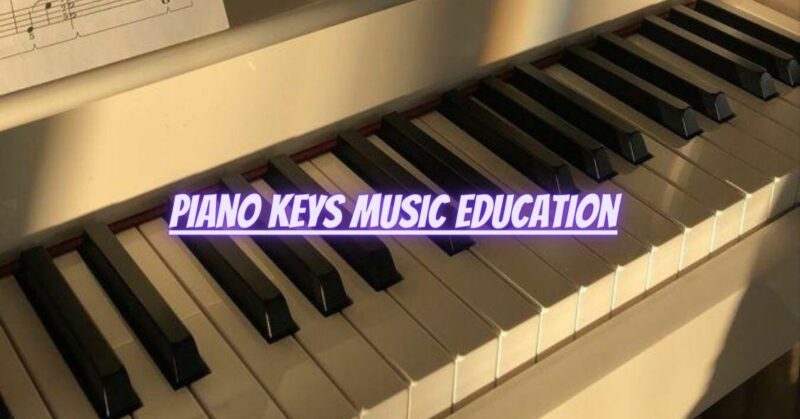The piano, with its enchanting keys, has been a cornerstone of music education for centuries. Its versatility, rich sound, and ability to showcase the entire range of musical concepts make it an ideal instrument for both beginners and advanced musicians. Whether taught in formal music schools, private lessons, or through self-guided learning, the piano keys play a crucial role in music education. In this article, we’ll explore the significance of piano keys in music education and how they serve as a gateway to musical discovery and learning.
1. Intuitive and Accessible Instrument:
The piano’s keyboard layout is one of the most intuitive and accessible among musical instruments. The arrangement of black and white keys makes it easy for beginners to understand pitch and identify notes. This simplicity allows aspiring musicians to start playing melodies and songs relatively quickly, fostering a sense of accomplishment and motivating them to continue their musical journey.
2. Visual Representation of Music Theory:
Piano keys provide a clear visual representation of music theory concepts. Students can see how intervals, scales, chords, and melodies are formed on the keyboard. This visual connection helps in understanding music theory principles and enhances the comprehension of musical structures.
3. Development of Motor Skills:
Playing the piano requires coordinated use of both hands, promoting the development of fine motor skills. As students progress, they learn to use their fingers independently, improving dexterity and hand-eye coordination. These skills can be beneficial not only for piano playing but also for various other activities in life.
4. Ear Training and Listening Skills:
The piano allows students to hear the relationship between different notes and intervals. Through ear training exercises, students learn to identify pitches, recognize melodies, and develop their listening skills. This capability is essential for musicians to play in tune, harmonize, and improvise effectively.
5. Music Reading Proficiency:
Learning to read sheet music is an integral part of piano education. By associating the notes on the staff with their corresponding keys on the piano, students improve their music reading proficiency. This skill can be applied to learning other instruments or vocal performance.
6. Repertoire Exploration:
The vast repertoire available for piano spans various musical styles and genres, from classical and jazz to contemporary and popular music. This diverse selection allows students to explore different musical periods and discover pieces that resonate with their individual tastes and interests.
7. Solo and Ensemble Performance:
The piano is an excellent instrument for both solo and ensemble performance. As students progress, they have the opportunity to play solo pieces, collaborate with other musicians, and participate in chamber ensembles or accompaniments. This exposure enhances their performance skills and fosters a sense of teamwork and musical communication.
8. Composition and Arrangement:
The piano’s keyboard layout facilitates experimentation with musical ideas, making it an ideal instrument for aspiring composers and arrangers. Students can explore harmonies, create melodies, and develop their creative expression through composition.
9. Music Appreciation and Expression:
Playing the piano opens the door to a deeper appreciation of music. Students learn to interpret and express emotions through their performances, developing their artistic voice and fostering a connection with the music they play.
Conclusion:
The piano keys hold a special place in music education, offering a myriad of benefits to students of all ages and skill levels. From nurturing a strong foundation in music theory to developing technical and expressive skills, the piano serves as a gateway to musical exploration and discovery. Whether pursued as a primary instrument or used as a foundation for learning other musical disciplines, the piano’s influence on music education is profound and enduring. As students delve into the enchanting world of piano keys, they embark on a lifelong journey of musical growth and enrichment.


